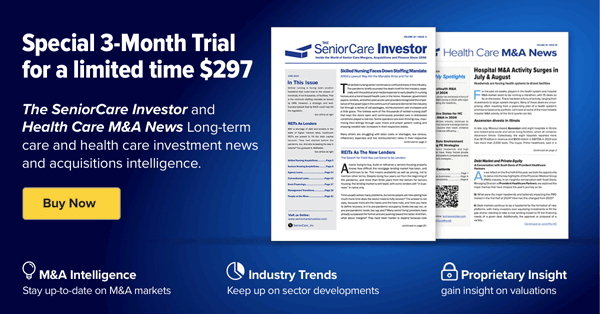The healthcare editorial team at Irving Levin Associates sat down with industry veterans Mike Moran and Andre Ulloa to discuss the launch of their new advisory firm, M&A Healthcare Advisors (MAHA), and the state of the healthcare M&A market. MAHA aims to transform the M&A experience for lower-middle market healthcare business owners by providing highly accessible, transparent and experience-driven seller-representation services throughout the entire sale process.
- What motivated you to launch the new firm?
- Andre: We saw a huge void when it came to lower-middle market seller representation in the healthcare industry. These smaller healthcare agencies are often overlooked by investment banks and other advisory firms given the anticipated size of the transaction. We are nimbler than a larger bank and can provide the much-needed representation for those smaller healthcare businesses. Combined, our team has more than 20 years of experience in the healthcare M&A space. In that regard, our clients can expect a high level of expertise, as we handle all aspects of the transaction, other than legal. Our goal is to manage the sale process so our clients can remain focused on operating their business and, most importantly, continue to care for their patients. Our representation is particularly important as more financial investors, such as private equities, enter the healthcare market and bring with them a high-level of scrutiny in the due diligence process. As advisors, we protect the sellers’ interests throughout negotiations, which usually means maintaining their valuation by anticipating where the buyer intends to adjust the terms of the deal.
- Mike: To add to that, a company’s valuation could be affected by hiring the wrong advisory firm. Not having the proper guidance for a transaction could be detrimental to a valuation and finishing a deal. We guide our clients through the entire sale process including managing all aspects of due diligence, which is usually lengthy, time consuming and complex.
- You’re launching the new firm at a time of unprecedented activity in the healthcare M&A market. What is driving so much activity? Are there any sectors or type of companies in high demand that you’re seeing?
- Andre: 2020 showed the resiliency of healthcare. The industry is strong because its product can’t be outsourced and the population of those in need continues to grow. Unfortunately, our country is not getting healthier each year. The sad fact is that America is getting sicker and older, from a healthcare commerce perspective, and it creates a lot of consistent growth and forward-looking potential. These are industry segments where there is an abundance of capital invested and even more is ready to be deployed. There is also fragmentation, especially in lower-middle market healthcare services. Those looking to consolidate have tremendous opportunity to invest, build the infrastructure, and grow their portfolio. Lastly, for all the damage in 2020, one of the few bright spots was observed on healthcare balance sheets. Between the CMS stimulus money, PPP loans, and loosening of certain healthcare compliance; like the loosening of the restrictions on what it means to be “home-bound”, most healthcare companies were able to thrive despite the pandemic. As for what healthcare segments are in high demand, we would have to say that first, Home Health, because it is abundantly clear that the safest and most cost-effective way to be treated is within the home. Secondly, Behavioral Health, due to the rising demand for treatment in these extremely trying times.
- To bounce off that, is this a buyer’s or seller’s market? What do valuations look like?
- Mike: Unequivocally a sellers’ market. The increase in acquisition activity is happening due to a surge of buyers, more than usual in healthcare. During the pandemic, most of our clients were extremely resilient when it came to maintaining revenues and their overall operations. For example, many of our behavioral health clients were able to adopt a telehealth solution as we all tried to make sense of what was going on at the outside of Covid.
- Andre: Themarket is defined by what sellers of well-run operations are willing to accept. Many are thriving and are not in a position where they must sell. For the most part, sellers do not need to sell, but buyers appear to need growth through acquisitions. Large strategics have the need to increase market share and can’t do it fast enough through organic growth. And financial firms, especially those with institutional funds, need to bolt onto a platform. Overall, we are seeing an increase in multiples across many segments within healthcare.
- It seems like there are a ton of tailwinds in the industry. Are there any potential headwinds coming our way?
- Andre: The possibility of a Capital gains increase could discourage sellers from entering the market. Also, there is a quite a bit of concern on main street about current monetary policy and the potential for a devaluing dollar leading to hyper-inflation. A small business, that is generating a profit, may be the best place to preserve wealth and hedge against inflation. Please take that with a large grain of salt. We don’t prognosticate on the macro-economy. Our clients work with us when they are ready to sell. That’s what we know how to do.
- Mike: We work with a lot of “small to mid-sized” businesses, and when these businesses tread on the heels of larger corporate entities, there is not as much support like there is for larger firms. There is a limit to the amount of money that will potentially be funneled to these businesses. For example, in the pharmacy market, a [pharmacy benefits manager] will assist in negotiating pricing, but that could really diminish the cash flow and profits of retail and specialty pharmacies. If there isn’t more advocacy for these services and small businesses, these operators could be forced to close.
To contact the MAHA team, email info@mahealthcareadvisors.com or visit them at www.mahealthcareadvisors.com


